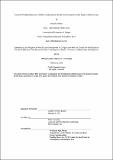| dc.contributor.advisor | John Kennedy. | en_US |
| dc.contributor.author | Smicka, Daniel. | en_US |
| dc.contributor.other | Massachusetts Institute of Technology. Center for Real Estate. Program in Real Estate Development. | en_US |
| dc.coverage.spatial | s-bl--- | en_US |
| dc.date.accessioned | 2021-05-24T19:53:17Z | |
| dc.date.available | 2021-05-24T19:53:17Z | |
| dc.date.copyright | 2021 | en_US |
| dc.date.issued | 2021 | en_US |
| dc.identifier.uri | https://hdl.handle.net/1721.1/130731 | |
| dc.description | Thesis: S.M. in Real Estate Development, Massachusetts Institute of Technology, Program in Real Estate Development in conjunction with the Center for Real Estate, February, 2021 | en_US |
| dc.description | Cataloged from the official PDF of thesis. | en_US |
| dc.description | Includes bibliographical references (pages 80-81). | en_US |
| dc.description.abstract | With a large, growing, and young population, Brazil suffers from a chronic shortage of affordable housing. This crisis, in particular, negatively affects new and economically ascending entrants to the housing market. This economic crisis is unfolding concurrently with the global environmental challenges associated with climate and sustainability. This thesis explores the application of modular construction in an affordable housing project in Cuiaba, Brazil. This thesis is comprised of three distinct sections. Section I provides a historical overview of offsite construction with a particular focus on precast concrete in modular construction. It describes the forces and some of the most notable projects and figures that shaped precast construction - especially in its European cradle. It further provides a comprehensive classification of current modular construction and discusses its benefits and limitations. Section II analyzes Brazil's ongoing housing crisis and Brazil's economic trends and realities. It discusses Brazil's National Housing Policy and its flagship program - Minha Casa, Minha Vida. Section III takes the reader to Cuiaba, Mato Grosso's capital, and proposes a 528-unit affordable housing development project there. It explores the establishment of a mobile concrete precasting plant and analyzes the production and application of a novel modular concrete system in the project. Particular attention is paid to the financial viability of the project. | en_US |
| dc.description.statementofresponsibility | by Daniel Smicka. | en_US |
| dc.format.extent | 81 pages | en_US |
| dc.language.iso | eng | en_US |
| dc.publisher | Massachusetts Institute of Technology | en_US |
| dc.rights | MIT theses may be protected by copyright. Please reuse MIT thesis content according to the MIT Libraries Permissions Policy, which is available through the URL provided. | en_US |
| dc.rights.uri | http://dspace.mit.edu/handle/1721.1/7582 | en_US |
| dc.subject | Center for Real Estate. Program in Real Estate Development. | en_US |
| dc.title | Concrete prefabrication and offsite construction in Brazil : a development case study in Mato Grosso | en_US |
| dc.type | Thesis | en_US |
| dc.description.degree | S.M. in Real Estate Development | en_US |
| dc.contributor.department | Massachusetts Institute of Technology. Center for Real Estate | en_US |
| dc.identifier.oclc | 1251804486 | en_US |
| dc.description.collection | S.M.inRealEstateDevelopment Massachusetts Institute of Technology, Program in Real Estate Development in conjunction with the Center for Real Estate | en_US |
| dspace.imported | 2021-05-24T19:53:17Z | en_US |
| mit.thesis.degree | Master | en_US |
| mit.thesis.department | RED | en_US |
